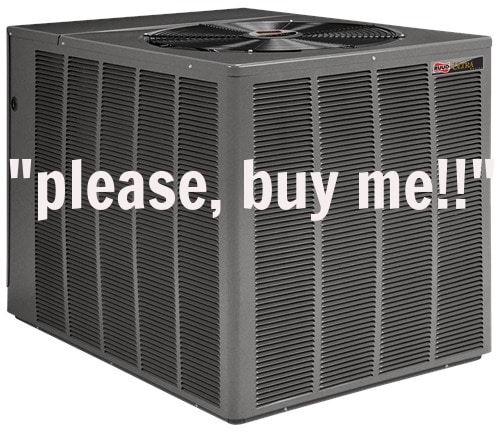BEFORE YOU BUY: 2 MAJOR DIFFERENCES BETWEEN TRANE VS RUUD HVAC EQUIPMENT
GROUND RULES – This discussion is for consumers. Those looking to purchase a new HVAC system. Often times this sort of discussion gets bogged down by technicians who cloud out the primary purchasing factors that consumers should focus on. Now before we go much further I should warn you that this discussion is not exhaustive AND there are definite nuances to every purchasing scenario since the variables can be exceedingly diverse from home to home and customer to customer (i.e.. efficiency, system size, system location, geography, building materials, type, etc). If you have some more specific questions leave a comment below or feel free to email or call us. We’d be glad to discuss it.

Download the latest information on the difference between Trane vs Ruud HVAC equipment
1. PRICE – TRANE is typically (not always) more pricey. Now this can vary from contractor to contractor because some individual companies charge more or less for their labor rates and/or buy more volume of one brand etc etc HOWEVER as a general rule Trane is a more pricey system to buy. Ruud is more reasonable, especially in the 13-14.5 SEER range. Ruud has some awesomely reliable and affordable baseline equipment.
Trane, for all its marketing, has done a decent job of positioning itself as a higher end than other brands. It’s a better-known product. Is some of what they sell fluff…. probably. Still, they are a known quantity and sell decent equipment. Are they lightyears beyond the competitors? no. Do you pay more for a better-known sticker on the box? Yes.

2. TECHNOLOGY – HVAC systems are a transfer of heat business with the end goal of making people(mostly) comfortable. Either adding heat in winter OR removing it in the summertime. During the summer a primary vessel for heat transfer is the outdoor condensing coil. Trane and Ruud utilize very different types for this heat rejection process. Trane uses “spine fin” while Ruud uses radiator fin. Spine fin has been touted as better. NOT off the block because each system can often times come from the factory with the same efficiency but Trane’s spine fin apparently holds up better over time. Making it more efficient over the long run.
If you are looking to purchase a very high efficient system. And by very high efficient I mean 17 SEER or higher. Trane currently has the upper hand over Ruud (and many others including Carrier, Bryant, york, Rheem, etc.). Their advantage is in their inverter compressors in the 18-20.5 SEER range. These puppies have hundreds of speeds. Compare that to Ruud (and almost all other major HVAC companies) 2 stages. Beyond the fact that the unit is a better performing machine, it is also general LESS expensive to buy a Trane 18 SEER than a Ruud 18 SEER. WHAT? No Trane is NOT always more expensive than Ruud!
CONCLUSION
WHICH UNIT IS ACTUALLY BETTER? Trane or RUUD
Again, the solution is complicated and it frankly depends on what you’re going for. My advice? Go find a very good contractor with a solid track record first. They should be reasonable people that you like. Check one. Make sure the company has quality standards for how the company performs its work. NOTE: Proper installation is MORE important than brand particulars ESPECIALLY if you are buying a system that is 16 SEER and lower.
Going for a system that is 18 SEER or higher? Trane’s product is superior to Ruud in this efficiency range.
WARNING: Be wary of the “cheapest” bid when looking to buy a premium product. Often times pricing (not always) may reflect lacking experience or corners cut.
Contact the Houston HVAC professionals today!
Related:
Which 14 – 16 SEER residential Carrier, Trane, and Ruud is best? Which is the very best air conditioning brand for my home? Compare Trane, Carrier and Ruud top rated AC units with midrange efficiency.
Why do AC & Furnace technicians believe the Nest Learning Thermostat is bad? Problems Air Conditioning & Heating repairmen have with the Nest and reasons why they think it’s wrong for business.
Is AC Hard to Learn? READ THIS HVAC FOR DUMMIES article and learn how AC works in less than 5 minutes. Since one of the most powerful ways to learn is to build off of something you are extremely familiar with we will compare an HVAC system to the human body.



